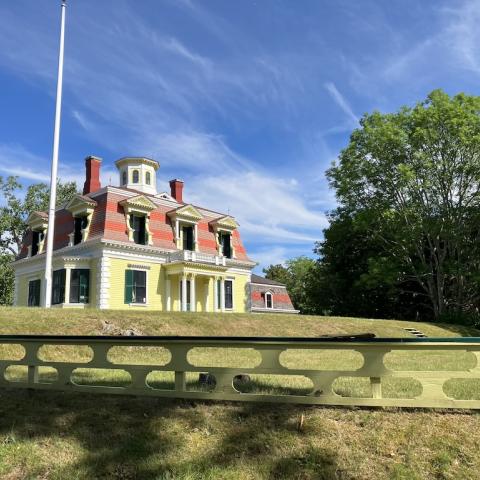
Piping plover habitat was damaged last weekend at Cape Cod National Seashore by a joyrider. Wooden stakes marking the habitat can be seen on the right side of the photo/NPS
Piping plover habitat at Cape Cod National Seashore in Massachusetts was damaged when a vehicle drove onto a beach there and through nesting habitat, though apparently no birds or nests were run over.
Vehicle tracks roamed several miles through part of Coast Guard Beach between Truro and Eastham, passing by, and running over in places, wooden stakes with string and signs set up to create a protective barrier around the birds' habitat, said Deputy Chief Ranger Ryan Wright. They were discovered Sunday morning, he said.
"No plovers were killed, no nests destroyed, nothing of that nature, it was a little bit closer than we would like," he said Thursday. "The driver actually drove into a couple of them, breaking the posts and the string."
Piping plovers along the Atlantic Coast are listed under the Endangered Species Act as endangered. If the driver is caught, they would face a potential penalty of six months in jail and a $5,000 fine.
"We're hoping someone in the public saw something and will reach out, said Wright.
Cape Cod Superintendent Brian Carlstrom said he was "alarmed by this deliberate destruction of endangered species habitat, and we strongly encourage anyone with information to reach out to investigators."
Seashore officials ask that you contact them if you were on the coast between Coast Guard Beach in Eastham and Coast Guard Beach in Truro last Saturday evening or Sunday morning and saw a non-government vehicle driving on the beach.
Though not a frequent occurrence, beach drivers at national seashores in the past have disturbed or killed threatened or endangered species. Back in June 2010 a beach driver ran over and killed a loggerhead sea turtle at Cape Hatteras National Seashore on North Carolina's Outer Banks.
Seashore biologists placed 92 of her eggs in a nest cavity, and six continued their incubation and hatched. The driver never was caught.


 Support Essential Coverage of Essential Places
Support Essential Coverage of Essential Places







Add comment